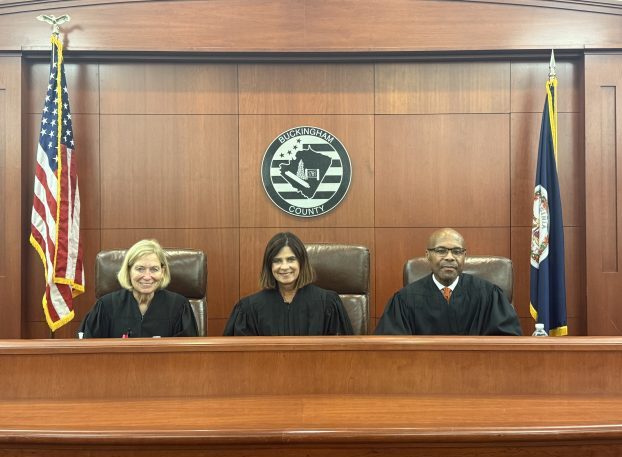Farmville ICE Detention Center included in ACLU lawsuit
Published 5:23 am Friday, August 4, 2023

- A look at the outside of the Farmville ICE detention center.
|
Getting your Trinity Audio player ready...
|
FARMVILLE – German Fuentes and a man identified as “Mr. Gonzalez” both won their immigration cases, given permission to stay in this country. That part isn’t in dispute. And yet, more than three months after winning that ability to stay, both men are still being held in the Farmville Immigrations and Customs Enforcement (ICE) detention center. They, along with a third man, Carlos Guzman Lopez, who is being held at the Caroline County ICE facility, are at the center of a lawsuit filed Thursday.
Farmville ICE Detention Center warden Jeffrey Crawford is named in the lawsuit, as is Caroline Detention Center warden Paul Perry, ICE, Homeland Security Secretary Alejandro Mayorkas and U.S. Attorney General Merrick Garland. As for who filed the lawsuit? That would be a combination of the American Civil Liberties Union (ACLU) of Virginia, the Capital Area Immigrants’ Rights Coalition (CAIR) and the National Immigration Project (NIP).
The case is based on one question. Is it legal for ICE to continue to detain someone, regardless of the result of their court case? That’s what the ACLU alleges is happening now.
“Immigration and Customs Enforcement refuses to release petitioners, claiming that it is looking for alternative countries of removal,” says the ACLU lawsuit. And that is the current situation. In March 2023, an immigration judge ruled that Fuentes would likely face persecution or torture if he was sent home to El Salvador. One month later, the judge found the same for “Mr. Gonzalez” if he returned to Honduras. And the same went for Guzman Lopez in May of this year, should he return to El Salvador.
Withholding removal
As a result, all three men, in their respective cases, fell under specific guidelines. If a judge rules in your favor during a case like this, they can do so in two ways. First, they can grant you “withholding of removal” protection. That is what happened with the man named “Mr. Gonzalez” in the lawsuit.
Withholding of removal is similar to asylum. According to the American Immigration Council (AIC), a person under a “withholding of removal” order is protected from being deported to their home country, receives the right to remain in the United States and work legally. But there is a catch. “An immigration judge (still) enters a deportation order and then tells the government they cannot execute that order,” AIC officials said in a statement on their website. While the person is protected from being deported to their own country, “the government is still allowed to deport that person to a different country, if the other country agrees to accept them,” the council explains.
In this case, that’s what the ACLU claims is happening to “Mr. Gonzalez”. He’s being held in custody while immigration officials try to find another country that is willing to take him. But the question here is at what point should that process end? The ACLU argues it’s already been too long, as the ruling was in April and now, more than three months later, “Mr. Gonzalez” is still being held in the Farmville ICE Detention Center.
Deferral of removal
Now as mentioned before, there’s a second way the judge can rule in a case like this. He or she can grant deferral of removal. That’s what happened to both Germano Fuentes in Farmville and Carlos Lopez in Caroline.
This means a judge has put in a deportation order, but tells the government not to enforce it right now. Now the American Immigration Council says a judge issues this, rather than the withholding mentioned above, to people who have a criminal record or could be considered some type of security risk due to other reasons determined by the court.
Basically, yes, they’ve proven returning home would be dangerous. But the judge has some concerns about their stay here.
It’s not quite the same as withholding. Anyone granted deferred removal can be held in detention and aren’t automatically given employment authorization. They can be released and given that approval, however, by order of the regional ICE director.
But as with the case of “Mr. Gonzalez”, the question here is about time. How long should a person be detained, after being granted deferred status? Those involved with the lawsuit argue ICE is dragging this out.
“They’ve been doing this for a while, but it’s gotten worse,” said Austin Rose. He serves as legal counsel for the CAIR Coalition. “For a while, they have been holding people for about 90 days or three months after winning. Some ICE officers say they have to do it. Some say they can do it, based on their reading of the statues and their internal practices.”
Remaining at Farmville ICE Detention Center
Rose claimed that since his group started tracking release dates in Virginia, in 13 of 14 cases, ICE continued to detain the person for at least three months after they had won in court. He points out that ICE’s own policies say people in these situations should be released if they win in court, barring exceptional circumstances.
“Our question is why are they not following their own policy?” Rose said. “In none of these cases have we been able to determine what these exceptional circumstances are.”
The Herald reached out to ICE officials and were told they couldn’t comment, due to the lawsuit.
“These questions are tied to pending litigation,” said James Covington. He works as the public affairs officer for the ICE field offices in Washington D.C. and Baltimore. “For legal reasons, ICE cannot comment on pending litigation.”
A hearing date for the lawsuit has not yet been determined.
For more on the ICE detention center in Farmville, click here.





